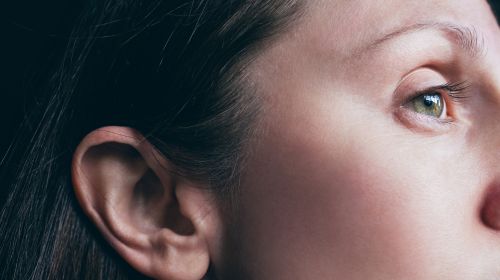Sudden loss of hearing, it feels like there is cotton in the ear: These and other symptoms can indicate sudden hearing loss. It usually occurs suddenly and without any apparent cause. A sudden hearing loss is not an emergency, but should be clarified as quickly as possible. Find out how exactly sudden hearing loss can be recognized and treated.
Quick overview: sudden hearing loss
Symptoms: A sudden hearing loss occurs, usually on one side. Those affected feel as if they have cotton in their ears. Ringing in the ears and dizziness are also possible.
Cause: The exact cause usually cannot be determined. Factors such as stress, fluctuations in blood pressure or problems with the cervical spine probably play a role.
Diagnosis: Various examinations of the ears (audiometry, earoscopy, hearing tests) are used for diagnosis. Other diseases must be ruled out.
Therapy: If an underlying disease is known, it must be treated. If the cause is unknown, high doses of cortisone, which has an anti-inflammatory effect, are usually administered.
Article contents at a glance:
What is sudden hearing loss?
A sudden hearing loss (also: ear infarction) results in a sudden, one-sided hearing loss or even complete hearing loss. The affected person usually describes a dull feeling in the ear, and ringing in the ears can also occur.
A sudden hearing loss does not always need to be treated. In around half of those affected, it disappears on its own within a few hours or after two days at the latest. If hearing does not improve, medical help should be sought as quickly as possible.
Sudden hearing loss: who is affected?
Sudden hearing loss usually occurs in old age, often in people over 50 years of age. Ear infarction is rare in children.
Current figures on the frequency of sudden hearing loss are not available. According to the guidelines, which were extended until 2019, around 160 to 400 out of 100,000 people in Germany suffer sudden hearing loss every year.
Sudden hearing loss: What symptoms occur?
In the case of sudden hearing loss, usually only one ear is affected. Hearing loss can increase over the course of hours, but can also appear as sudden deafness. The affected sound frequencies also differ from case to case and can no longer be heard correctly. Some people affected no longer hear high tones as clearly as they did before the hearing loss, while others hear medium or low tones.
Accompanying tinnitus or unpleasant pressure on the ear can be additionally stressful. However, there is no pain.
Typical signs at a glance:
- Hearing loss
- Tinnitus noises (whistling, humming or beeping)
- Hypersensitivity to noise (hyperacusis)
- dull feeling (like cotton in the ear)
- furry or numb feeling in the auricle
- Dizziness (since the balance organ is located in the inner ear)
Causes: Why does sudden hearing loss occur?
The exact causes of sudden hearing loss are still unknown. This is why doctors also speak of acute idiopathic inner ear hearing loss. Idiopathic means that no cause can be proven.
However, experts suspect that in the event of sudden hearing loss, the blood flow to the inner ear is reduced by various factors. As a result, the sensory or hair cells located there are no longer adequately supplied with oxygen. These can then no longer correctly perceive sound waves in a certain frequency range and convert them into false electrical signals that are passed on to the hearing center in the brain.
Possible triggers for circulatory disorders are:
- acute or chronic stress
- Signs of wear and tear on the cervical spine (e.g. as a result of a head trauma)
- Blood pressure fluctuations
- stroke
- Diabetes mellitus
- Heart disease
Other risk factors that can promote sudden hearing loss:
- viral infections that primarily affect nerves (mumps, measles, influenza or adenoviruses)
- bacterial infections (for example as a result of middle ear infections or Lyme disease)
- Autoimmune diseases
- Cervical vertebrae and jaw misalignments
- Tumor diseases
- too high cholesterol levels
- Smoke
Noise
Diagnosis of sudden hearing loss
If sudden hearing loss is suspected, those affected should visit an ear, nose and throat (ENT) practice no later than one or two days after the symptoms appear. First, there is a detailed discussion (anamnesis), in which, for example, existing complaints and possible previous illnesses are asked.
This is usually followed by various examinations of the ears, for example using:
Ear microscope: The ear is examined to detect foreign bodies, inflammation in the ear canal, injuries or changes to the eardrum caused by a middle ear infection.
Hearing test (Weber test): To do this, a vibrating tuning fork is placed on the patient’s head. The sound of the tuning fork is transmitted through the bones and is perceived equally loudly on both sides by healthy people. In the event of a sudden hearing loss, those affected perceive the sound to be louder in their healthy ear.
Otoscopy (ear examination): Doctors use an ear loupe to examine the external auditory canal and the eardrum.
Audiometry: Sounds in different frequency ranges and volumes are played via headphones. In this way, the extent of the hearing impairment can be better assessed.
In addition, further examinations are often carried out to rule out various diseases that can also cause hearing problems. These include, for example, inflammation of the ear trumpet, a herpes infection in the ear or Menière’s disease (paroxysmal vertigo).
Sudden hearing loss: This is how the treatment works
A sudden hearing loss with hearing loss should be clarified by a doctor after one or two days at the latest. Since stress seems to play a significant role in the development of sudden hearing loss, patients are recommended to reduce it as much as possible. Alcohol and nicotine should also be avoided at best.
This is how acute sudden hearing loss is treated medically:
Treatment with cortisone: One of the most important properties is the anti-inflammatory effect. The medication is administered in the form of tablets, given into the bloodstream via an infusion, or injected directly into the middle ear. Glucocorticoid injections usually have fewer side effects, but in rare cases ear pain or temporary dizziness may occur.
Oxygen hyperbaric treatment: Patients breathe in pure oxygen through an oxygen mask in a pressure chamber. The blood is thus enriched with oxygen. Those with statutory health insurance have to pay for the therapy themselves; a session costs around 200 euros. The effectiveness has not been proven.
If the sudden hearing loss is caused by a specific illness, this must be treated. For example, antibiotics may be prescribed for bacterial infections. If problems with the cervical spine are responsible, physiotherapeutic treatment may be useful.
Good to know:
In about half of the cases, no therapy is necessary and the sudden hearing loss can heal spontaneously on its own. Whether it makes sense to wait should only be decided by ENT specialists. If left untreated, there is a risk of impaired hearing or permanent ringing in the ears.
Course and prognosis of sudden hearing loss
The probability of suffering a second hearing loss after one is around 30 percent. Those who continue to have high blood pressure or are exposed to other risk factors are particularly at risk.
Overall, the chances of recovery from sudden hearing loss are good: in around half of all cases, hearing improves again within the first 24 hours, regardless of treatment. The rate of spontaneous healing in the first few weeks after sudden hearing loss is high. In 60 to 90 percent of those affected, no damage remains.
Even severe cases often heal completely with early treatment. However, untreated sudden hearing loss can lead to permanent hearing loss. In this case, those affected sometimes receive a hearing aid or cochlear implant (hearing prosthesis).

